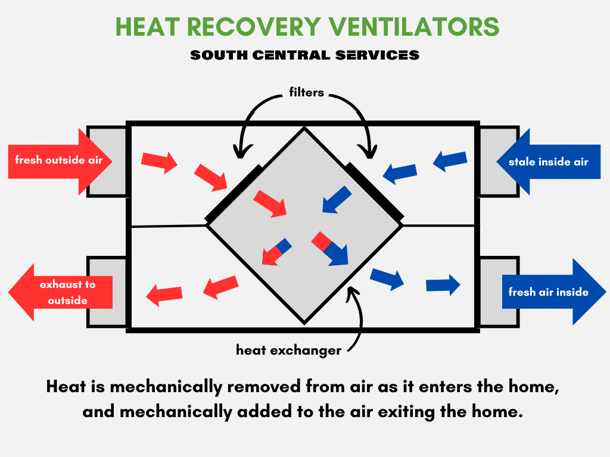A Practical Guide to HRV Maintenance
Discovering the Benefits of Heat Recovery Ventilation for Energy Effectiveness in Houses
Heat Recovery Ventilation (HRV) systems offer house owners a functional method to boosting power performance. By recovering heat from outward bound air, these systems can significantly decrease cooling and heating costs. In addition, they provide a stable supply of fresh air, improving interior air high quality and convenience degrees. As home owners think about lasting choices, comprehending the subtleties of HRV systems ends up being increasingly crucial. What factors should one assess prior to making such a financial investment?
Recognizing Heat Recovery Ventilation Systems

Exactly How HRV Boosts Indoor Air High Quality

Energy Savings: The Economic Advantages of HRV
Making best use of energy performance, heat recovery ventilation (HRV) systems supply substantial monetary benefits for home owners. By recuperating and recycling warmth from exhaust air, HRVs noticeably lower home heating and air conditioning costs. This innovation can lead to power why not look here savings of up to 30%, depending on climate and use patterns. Home owners frequently discover lowered energy costs quickly after setup, making HRVs a financially smart investment with time. Additionally, numerous regions provide incentives or rebates for energy-efficient upgrades, even more improving the financial charm. As power costs remain to climb, the cost-effectiveness of HRVs comes to be progressively clear. Overall, the incorporation of HRV systems not just advertises power effectiveness but additionally adds to long-lasting financial savings for households.
The Ecological Effect of Heat Recovery Ventilation
A considerable ecological benefit of heat recovery ventilation (HRV) systems lies in their capability to reduce overall energy intake. By reclaiming warm from exhaust air and transferring it to inbound fresh air, HRV systems minimize the need for energy-intensive home heating and cooling approaches. This reduction in power need adds to reduce greenhouse gas exhausts, as much less fossil fuel is required to preserve comfy indoor temperature levels. Additionally, HRV systems improve indoor air high quality by successfully trading stale air with fresh advice outside air, reducing reliance on mechanical air conditioning systems that can hurt the setting. Generally, the application of HRV systems supports sustainable living methods and straightens with worldwide initiatives to combat environment modification by promoting energy efficiency in residential setups.
Selecting the Right HRV System for Your Home
Just how can homeowners assure they choose the ideal heat recovery ventilation (HRV) system for their requirements? Initially, they need to assess their home's dimension and format, as these variables affect airflow needs. Next, examining the system's efficiency ratings is essential, as higher ratings show much better efficiency and power savings. Homeowners should additionally take into consideration installment and upkeep expenses, comparing various brands and versions for value. In addition, it is very important to examine noise degrees, as some systems run more silently than others. Consulting with a/c professionals can offer tailored suggestions based on particular home problems. Analyzing individual evaluations and warranties can help in making a notified choice, ensuring that the chosen HRV system efficiently improves interior air top quality and energy efficiency.
Regularly Asked Questions

Just how Frequently Should I Tidy or Preserve My HRV System?
The frequency of cleansing or keeping a warm recovery ventilation (HRV) system typically depends on use and environmental variables. Normally, it is advisable to carry out maintenance every six months to guarantee peak efficiency and air high quality.

Can HRV Solutions Help Lower Moisture Degrees Indoors?
HRV systems can successfully reduce interior moisture levels by exchanging stagnant, humid air with fresh, drier air from outside. HRV Heat Recovery Ventilation. This procedure helps preserve a well balanced indoor atmosphere, improving convenience and avoiding moisture-related problems
What Is the Life expectancy of a Normal HRV System?
The lifespan of a regular heat recovery ventilation (HRV) system varies, usually lasting in between 10 to 15 years. see this here Regular upkeep can expand its performance and operational life, guaranteeing peak efficiency throughout its use duration.
Exist Any Type Of Noise Interest In HRV Systems?
Noise issues with HRV systems can develop, specifically from follower procedure. Several contemporary devices are made to lessen sound levels, guaranteeing they operate silently while keeping effectiveness, which deals with potential disturbances in living atmospheres.
Can I Mount an HRV System Myself, or Do I Required a Professional?
The individual contemplated whether to mount the heat recovery ventilation (HRV) system directly or employ an expert. Typically, while DIY installation is feasible, knowledge warranties correct capability and compliance with neighborhood building regulations, boosting system performance.